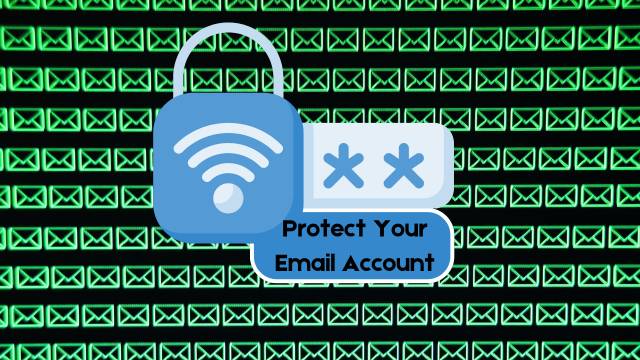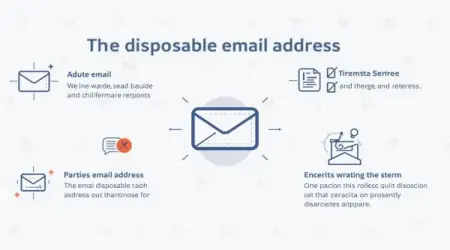How to Protect Your Email Account

How to Protect Your Email Account: Nowadays, email is a common tool hackers use to target their victims. This is a great method for bad actors to reach hundreds or thousands of people simultaneously with fraudulent messages. Email-based assaults may lead to phishing scams, malware infections, and other issues, so you must protect your account as much as possible
Free Make Money Online Micro Job & Best Freelancing Site
8 Ways to Protect Your Email Account
Let's discuss several ways to keep your email account safe from bad guys.
1. Make Your Password Robust and Distinct
Graphical user interface with a binary code backdrop
Although it may be apparent, many individuals reuse passwords across all their accounts. Despite its apparent convenience, this poses a significant risk. If you use the same password for all your accounts, a cybercriminal who obtains your email address and password may access all of your accounts.
Thus, this danger can be eliminated by using different passwords for each account. You may keep all your passwords in various places, including on a piece of paper, a hard disk, a password manager, or elsewhere. Please ensure that if you're keeping your passwords on a physical item, they are stored in a very secure area.
If you're using a password manager app, understand that these may be prone to attacks since they depend on internet connections and software applications to store your data, both of which are susceptible to abuse by hackers.
Some of you should also make your passwords as distinctive as possible so that these individuals are more difficult to break overall. Including upper-case letters, numerals, and symbols will help you here.
2. Use Your Provider's Anti-Spam Features
Spam signals warnings
Because spam mail is now so popular throughout the globe, email providers have created anti-spam solutions that you may use to prevent these unlawful messages. Different email providers offer different capabilities; however, if you're using a well-known and reliable email service, like Microsoft Outlook or Gmail, you'll likely be able to activate a spam filter that places any questionable emails in a spam folder.
This implies that most spam mail will not appear in your immediate inbox, which minimises the possibility of your engaging with it. You can always check your spam folder if you need to, since spam filters sometimes misinterpret genuine emails as harmful. But you should still be vigilant about what mail you select to deal with in your spam folder.
3. Block Suspicious Addresses
Cloaked guy with binary code streams
While some fraudsters may only try to contact you once or twice, others may make persistent efforts to get in touch. This is why you should block email addresses you have determined to be hazardous.
Blocking an email address is normally very fast and straightforward, although the procedure may change significantly depending on your service. You can generally do it by marking a single email, choosing the Block option, or going into your email account settings.
4. Use Two-Factor Authentication
Close-up view of the laptop keyboard
Two-factor authentication may help secure your email, social media, financial, and other accounts. This technique works by confirming a sign-in via another trusted device or platform. For example, if you're attempting to enter your Gmail, you may select to verify the login using your smartphone.
Alternatively, you may utilise security keys, have codes texted to you, or use authenticator software like Authy or Google Authenticator. This extra layer of protection makes it much tougher for a hostile actor to access your email account, even if they know your email address and password for login.
5. Use Antivirus Software on Your Devices
The lady on the laptop is wearing a face mask
Antivirus software should be a primary priority for everyone using a PC, laptop, smartphone, or tablet. It's now exceedingly simple for fraudsters to put malware onto your devices, whether to steal data, execute unlawful acts, or even demand a ransom.
While all antivirus solutions vary, respectable providers may conduct frequent scans of your device to discover and eradicate harmful malware and keep you secure. Cybercriminals regularly attempt to distribute malware via email, whether via malicious attachments or links; thus, running an antivirus application will help prevent such harmful software from infecting your device.
Antivirus applications may also block thieves from compromising your email account via malware. So, regardless of the angle by which malware is being exploited, having an antivirus product in place may help keep your email account secure.
6. Update Your Apps Regularly
Update the screen on the laptop
These days, many folks use their email accounts via applications. While you can normally access your email account over the web, using an app makes the procedure that much simpler, particularly if you're using your smartphone or tablet on the move.
But apps are not flawless. They can have vulnerabilities (or security weaknesses) that fraudsters can exploit. In an email program, for example, a cybercriminal may leverage a weakness to breach accounts, steal data, or propagate spam mail further.
Ten Tips to Get Reviews for Your Business
So, whenever you can, update your email apps. Updates may be tedious and time-consuming, but upgrading an email app shouldn't take long and can help eradicate problems or vulnerabilities. Updates may even provide you access to better security features, which can further secure your email account.
7. Use a "Burner" Email
A little green garbage can on the Ground
Sometimes, you want to sign up for something using your email address, but you're concerned about whether the platform is secure. At this stage, it's necessary to conduct a little investigation into the site to determine whether it can be trusted.
However, if the platform's general reputation is neither here nor there, and you still want to utilize it, try using a burner or throwaway email account. You can use this email account if you're worried about getting spam.
Of course, you shouldn't use a throwaway email for your daily emails. Its primary objective should be to protect your main account. So, do not connect your burner account to your genuine account, and do not save much data on it.
Depending on its purpose, you may use a burner email on a long- or short-term basis. However, having one available at all times may be very handy and can help keep potentially hazardous individuals away from your primary email account.
8. Avoid using public Wi-Fi to view emails.
Most public WiFi, such as that found in coffee shops and hotel rooms, is unencrypted. This implies that anyone using the same connection—potentially many individuals—may intercept and access your data. Because of this, it's best to avoid using public Wi-Fi for sensitive personal information, such as emails, but if you must, use a VPN. A VPN, or virtual private network, will encrypt your data so that anybody spying can't obtain access. Namecheap's Fast VPN is a superb security choice if you operate remotely.
Keep Your Email Safe and Avoid Scammers
Using the guidelines above, you can guarantee that your email account is as safe as possible against unscrupulous actors. With hackers regularly leveraging email providers to transmit malware and spam, you must be on top of your email security and do what you can to defend your account.









